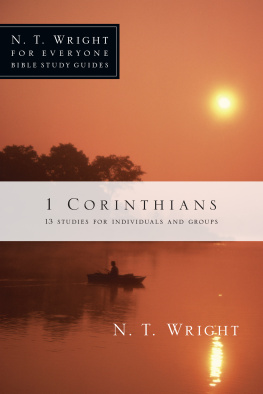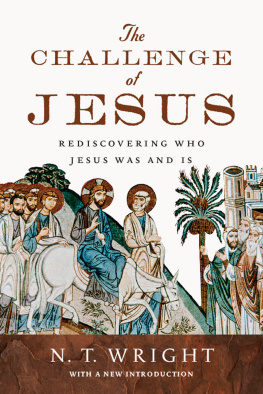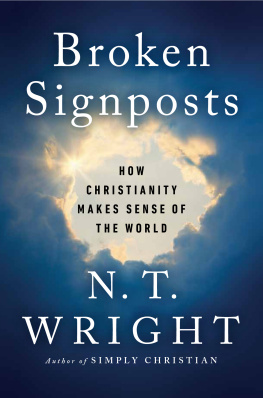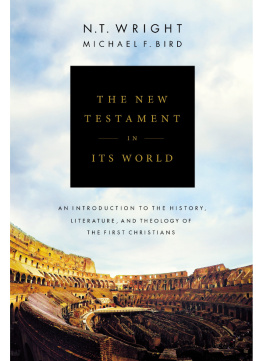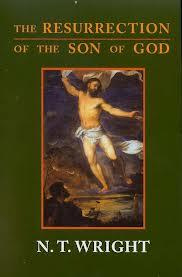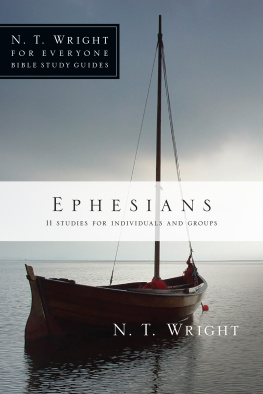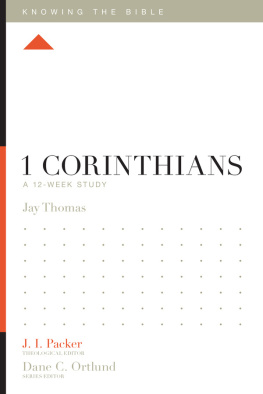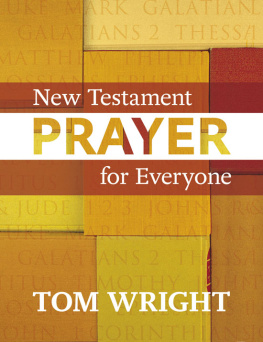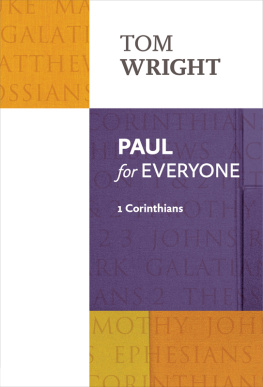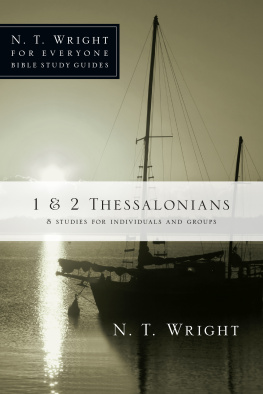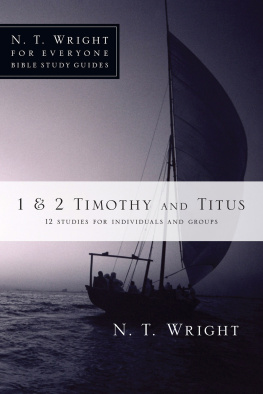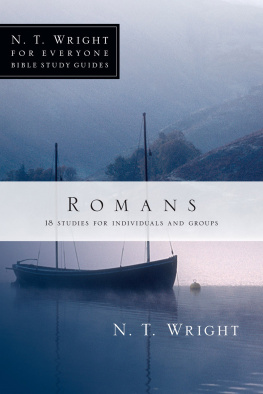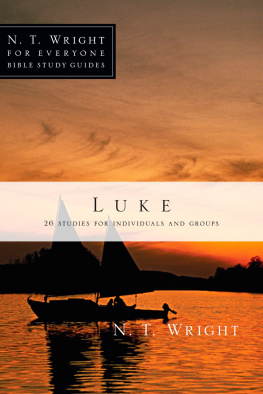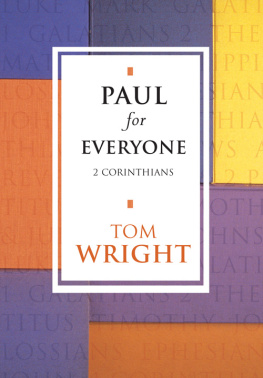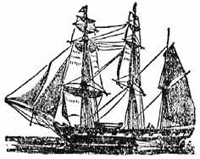Sommaire
Pagination de l'dition papier
Guide
1 CORINTHIANS
13 STUDIES FOR INDIVIDUALS AND GROUPS
N. T. WRIGHT
WITH DALE & SANDY LARSEN
InterVarsity Press
P.O. Box 1400, Downers Grove, IL 60515-1426
World Wide Web: www.ivpress.com
E-mail:
2009 by Nicholas Thomas Wright
All rights reserved. No part of this book may be reproduced in any form without written permission from InterVarsity Press.
This study guide is based on and includes excerpts adapted from Paul for Everyone: 1 Corinthians, 2003, 2004 Nicholas Thomas Wright. All Scripture quotations, unless otherwise indicated, are taken from the New Testament for Everyone. Copyright 2001-2008 by Nicholas Thomas Wright. Used by permission of SPCK, London. All rights reserved.
InterVarsity Press is the book-publishing division of InterVarsity Christian Fellowship/USA, a movement of students and faculty active on campus at hundreds of universities, colleges and schools of nursing in the United States of America, and a member movement of the International Fellowship of Evangelical Students. For information about local and regional activities, write Public Relations Dept., InterVarsity Christian Fellowship/USA, 6400 Schroeder Rd., P.O. Box 7895, Madison, WI 53707-7895, or visit the IVCF website at .
Cover design: Cindy Kiple
Cover image: Photos.com / Jupiter Images
Interior image: Clipart.com
ISBN 978-0-8308-6917-6 (digital)
ISBN 978-0-8308-2187-7 (print)
This digital document has been produced by Nord Compo.
GETTING THE MOST
OUT OF 1 CORINTHIANS
I n the first century, Corinth was a lively seaport in Greece, not far from Athens. People and cultures of every sort jostled together, just like so many places in todays world. The young church there was as lively as the place itself, with as many questions and problemsas much joy and excitementas any growing church today. Pauls pastoral sensitivity and deep insight come together to make this letter one of his crowning achievements, full of good things for us to ponder and enjoy today.
The city of Corinth had been destroyed by the Romans in 146 B.C., and rebuilt by Julius Caesar in 44 B.C. as a Roman colony. Since that time, about a hundred years before this letter was written, Corinth had prided itself on being a Roman city on Greek soil. It celebrated its Roman style of buildings, its Roman culture, its special links to the capital of a worldwide empire. It also prided itself on its intellectual life.
Most of the Christians in Corinth had not been Jews but ordinary pagans. They had been Gentiles, believing in various gods and goddesses, but without any idea that history, the story of the world, was going anywhere, or that their own lives might be part of that forward movement. Again and again Paul wants them to learn this lesson: that they have been caught up into a great movement of the love and power of the one true God, the God of Israel, whose work for the whole world had now been unveiled through the events concerning his Son. Thats why Jesus is at the center of the picture Paul paints.
That was the message Paul first brought to Corinth when he founded the church there in midcentury. But Paul hadnt been the only teacher theyd had in the city. Not long after hed gone, a wonderful speaker, greatly learned in Scripture and able to explain it powerfully, had arrived. His name was Apollos, and he came from Alexandria in Egypt, where there was a strong Jewish community which included a great Jewish philosopher by the name of Philo. Apollos met some of Pauls colleagues in Ephesus (see Acts 18:24-28) and later went to Corinth (see Acts 18:2719:1). Paul wrote his letter to the Corinthians from Ephesus while Apollos was probably still in Corinth. (For more on this letter, also see my Paul for Everyone: 1 Corinthians, on which this guide is based, published by SPCK and Westminster John Knox.)
In the time since Paul left Corinth after founding the church there (see Acts 18:18), various problems and questions had arisen. So the church sent a delegation consisting of Stephanas, Fortunatus and Achaicus with a letter, asking Paul to respond and give his counsel. This he did, and the result is the letter we have in 1 Corinthians.
SUGGESTIONS FOR INDIVIDUAL STUDY
1. As you begin each study, pray that God will speak to you through his Word.
2. Read the introduction to the study and respond to the Open question that follows it. This is designed to help you get into the theme of the study.
3. Read and reread the Bible passage to be studied. Each study is designed to help you consider the meaning of the passage in its context. The commentary and questions in this guide are based on my own translation of each passage found in the companion volume to this guide in the For Everyone series on the New Testament (published by SPCK and Westminster John Knox).
4. Write your answers to the questions in the spaces provided or in a personal journal. Each study includes three types of questions: observation questions, which ask about the basic facts in the passage; interpretation questions, which delve into the meaning of the passage; and application questions, which help you discover the implications of the text for growing in Christ. Writing out your responses can bring clarity and deeper understanding of yourself and of Gods Word.
5. Each session features selected comments from the For Everyone series. These notes provide further biblical and cultural background and contextual information. They are designed not to answer the questions for you but to help you along as you study the Bible for yourself. For even more reflections on each passage, you may wish to have on hand a copy of the companion volume from the For Everyone series as you work through this study guide.
6. Use the guidelines in the Pray section to focus on God, thanking him for what you have learned and praying about the applications that have come to mind.
SUGGESTIONS FOR GROUP MEMBERS
1. Come to the study prepared. Follow the suggestions for individual study mentioned above. You will find that careful preparation will greatly enrich your time spent in group discussion.
2. Be willing to participate in the discussion. The leader of your group will not be lecturing. Instead, she or he will be asking the questions found in this guide and encouraging the members of the group to discuss what they have learned.
3. Stick to the topic being discussed. These studies focus on a particular passage of Scripture. Only rarely should you refer to other portions of the Bible or outside sources. This allows for everyone to participate on equal ground and for in-depth study.
4. Be sensitive to the other members of the group. Listen attentively when they describe what they have learned. You may be surprised by their insights! Each question assumes a variety of answers. Many questions do not have right answers, particularly questions that aim at meaning or application. Instead the questions push us to explore the passage more thoroughly.

